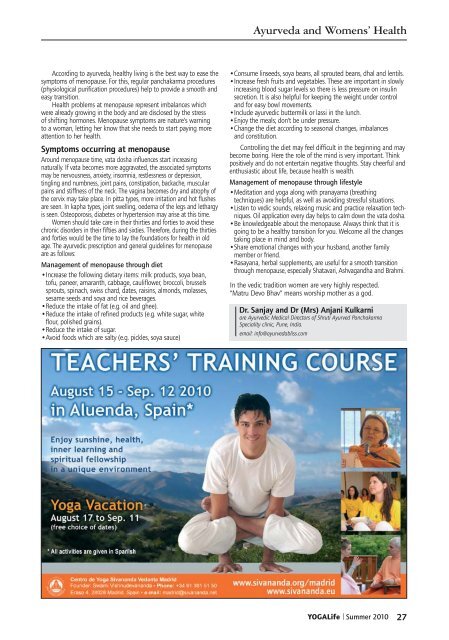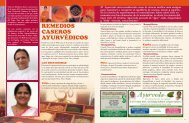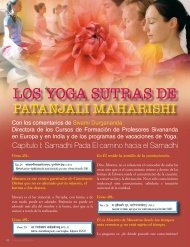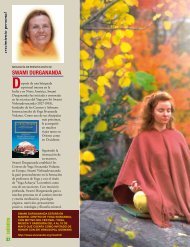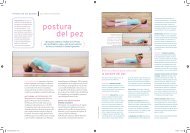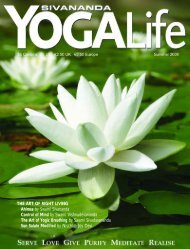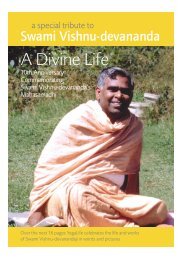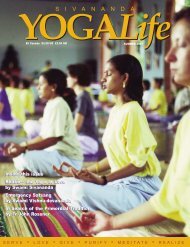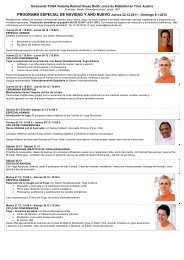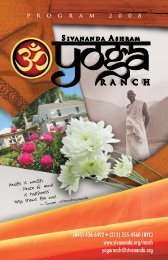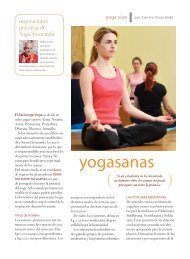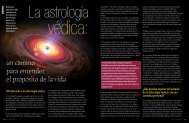YOGALife I Summer 2010 - Sivananda Yoga
YOGALife I Summer 2010 - Sivananda Yoga
YOGALife I Summer 2010 - Sivananda Yoga
You also want an ePaper? Increase the reach of your titles
YUMPU automatically turns print PDFs into web optimized ePapers that Google loves.
According to ayurveda, healthy living is the best way to ease the<br />
symptoms of menopause. For this, regular panchakarma procedures<br />
(physiological purification procedures) help to provide a smooth and<br />
easy transition.<br />
Health problems at menopause represent imbalances which<br />
were already growing in the body and are disclosed by the stress<br />
of shifting hormones. Menopause symptoms are nature’s warning<br />
to a woman, letting her know that she needs to start paying more<br />
attention to her health.<br />
Symptoms occurring at menopause<br />
Around menopause time, vata dosha influences start increasing<br />
naturally. If vata becomes more aggravated, the associated symptoms<br />
may be nervousness, anxiety, insomnia, restlessness or depression,<br />
tingling and numbness, joint pains, constipation, backache, muscular<br />
pains and stiffness of the neck. The vagina becomes dry and atrophy of<br />
the cervix may take place. In pitta types, more irritation and hot flushes<br />
are seen. In kapha types, joint swelling, oedema of the legs and lethargy<br />
is seen. Osteoporosis, diabetes or hypertension may arise at this time.<br />
Women should take care in their thirties and forties to avoid these<br />
chronic disorders in their fifties and sixties. Therefore, during the thirties<br />
and forties would be the time to lay the foundations for health in old<br />
age. The ayurvedic prescription and general guidelines for menopause<br />
are as follows:<br />
Management of menopause through diet<br />
•Increase the following dietary items: milk products, soya bean,<br />
tofu, paneer, amaranth, cabbage, cauliflower, broccoli, brussels<br />
sprouts, spinach, swiss chard, dates, raisins, almonds, molasses,<br />
sesame seeds and soya and rice beverages.<br />
•Reduce the intake of fat (e.g. oil and ghee).<br />
•Reduce the intake of refined products (e.g. white sugar, white<br />
flour, polished grains).<br />
•Reduce the intake of sugar.<br />
•Avoid foods which are salty (e.g. pickles, soya sauce)<br />
Ayurveda and Womens’ Health<br />
•Consume linseeds, soya beans, all sprouted beans, dhal and lentils.<br />
•Increase fresh fruits and vegetables. These are important in slowly<br />
increasing blood sugar levels so there is less pressure on insulin<br />
secretion. It is also helpful for keeping the weight under control<br />
and for easy bowl movements.<br />
•Include ayurvedic buttermilk or lassi in the lunch.<br />
•Enjoy the meals; don’t be under pressure.<br />
•Change the diet according to seasonal changes, imbalances<br />
and constitution.<br />
Controlling the diet may feel difficult in the beginning and may<br />
become boring. Here the role of the mind is very important. Think<br />
positively and do not entertain negative thoughts. Stay cheerful and<br />
enthusiastic about life, because health is wealth.<br />
Management of menopause through lifestyle<br />
•Meditation and yoga along with pranayama (breathing<br />
techniques) are helpful, as well as avoiding stressful situations.<br />
•Listen to vedic sounds, relaxing music and practice relaxation tech -<br />
niques. Oil application every day helps to calm down the vata dosha.<br />
•Be knowledgeable about the menopause. Always think that it is<br />
going to be a healthy transition for you. Welcome all the changes<br />
taking place in mind and body.<br />
•Share emotional changes with your husband, another family<br />
member or friend.<br />
•Rasayana, herbal supplements, are useful for a smooth transition<br />
through menopause, especially Shatavari, Ashvagandha and Brahmi.<br />
In the vedic tradition women are very highly respected.<br />
“Matru Devo Bhav” means worship mother as a god.<br />
Dr. Sanjay and Dr (Mrs) Anjani Kulkarni<br />
are Ayurvedic Medical Directors of Shruti Ayurved Panchakarma<br />
Speciality clinic, Pune, India.<br />
email: info@ayurvedabliss.com<br />
<strong>YOGALife</strong> I <strong>Summer</strong> <strong>2010</strong> 27


